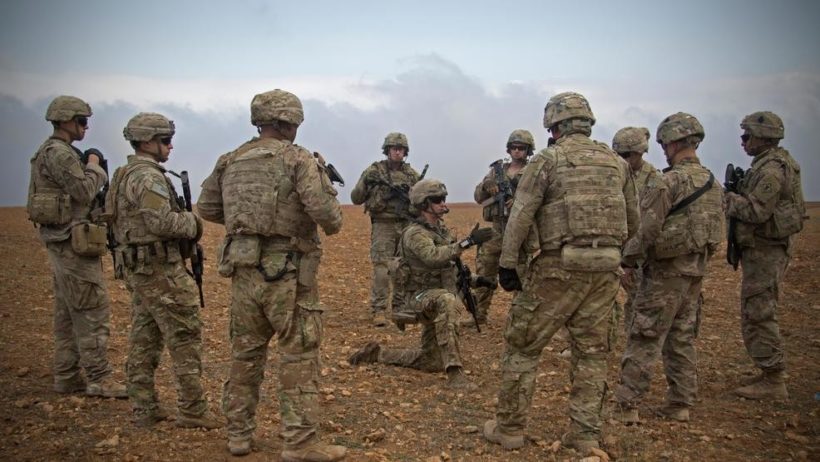
In this Nov. 7, 2018, photo released by the U.S. Army, U.S. soldiers gather for a brief during a combined joint patrol rehearsal in Manbij, Syria. (U.S. Army photo by Spc. Zoe Garbarino via AP)
redo Jump to...
print Print...
(Compiled from UK Daily Telegraph and UK Daily Mail) – President Trump is pushing a plan to require allies with U.S. troops stationed in their countries to bear more of the cost for hosting the troops.
The president wants such countries to not just cover the full cost of US troop deployment but also pay America an extra amount for the service. “Cost Plus 50,” means paying the full cost of deployment plus a further 50 per cent.
Several U.S. officials said Friday that the White House has asked the Defense Department to gather data on the costs of keeping troops in other countries and how much those nations contribute to the expenses.
As part of the “Cost Plus 50” plan, allies such as Japan and Germany would be asked to pay considerably more than they do now, Bloomberg News reports.
National Security Council spokesman Garrett Marquis said that getting U.S. allies to “increase their investment in our collective defense and ensure fairer burden-sharing” has been a long-standing U.S. goal.
“The Administration is committed to getting the best deal for the American people,” Marquis said in a statement issued Friday.
He declined to provide details on any ongoing deliberations.
Most NATO allies have a U.S. presence, but there are larger bases and military populations in countries such as Germany, England, Japan, Italy, Kuwait, Qatar and Bahrain.
It is understood that not all countries with US troops are being asked to pay “Cost plus 50,” with the exact extra percentage varying for each ally.
Furthermore the demand is seen as an opening position which may be negotiated down during talks.
The drive may be especially significant for Germany, which, according to an expert quoted by Bloomberg, currently pays just 28 per cent of the cost of US troops stationed there – around $1 billion.
Just last week, South Korea and the United States signed a deal that would increase Seoul’s financial contribution for the deployment of U.S. troops in the Asian country.
There are about 28,500 U.S. troops in South Korea.
Bloomberg reported that those talks almost went off the rails after Trump gave his national security advisor, John Bolton, a note saying “We want cost plus 50,” overruling his negotiators.
After rounds of failed negotiations, chief delegates from the two countries last month agreed on Seoul paying about 1.04 trillion won, or $924 million, in 2019 for the U.S. military presence, up from about $830 million last year.
Compiled from articles on March 8 at UK Daily Telegraph by Ben Riley-Smith and UK Daily Mail by Geoff Earle with AP. Reprinted here for educational purposes only.
Questions
1. The first paragraph of a news article should answer the questions who, what, where and when. List the who, what, where and when of this news item. (NOTE: The remainder of a news article provides details on the why and/or how.)
2. What is “Cost Plus 50”?
3. List U.S. ally countries that house larger U.S. military bases.
4. What percent of the cost for U.S. troops in Germany does that country pay?
5. Following WWII, the U.S. stationed troops in allied countries to protect these countries, as well as our own interests (against the Soviet Union…). U.S. taxpayers paid the cost for troops overseas, as these countries’ economies were building up.
Per wikipedia, Germany is currently the largest national economy in Europe, the fourth-largest by nominal GDP in the world, and fifth by GDP (PPP). In 2017, the country accounted for 28% of the euro area economy. In 2016, Germany recorded the highest trade surplus in the world worth $310 billion, making it the biggest capital exporter globally.
The U.S. provides protection and partnership (joint military drills and training…) for our allies around the world. U.S. troops in South Korea and Japan serve as a deterrent against the aggressions of China and North Korea.
Foreign policy experts, establishment Republicans and Democrats oppose the President’s push to require allies to “pay their fair share.”
Is President Trump wrong to push allies to “pay their fair share”? Explain your answer.
Background
NATO:
- The North Atlantic Treaty Organization (NATO) is an alliance of 29 countries from North America and Europe committed to fulfilling the goals of the North Atlantic Treaty signed on April 4, 1949.
- In 1949, there were 12 founding members of the Alliance: Belgium, Canada, Denmark, France, Iceland, Italy, Luxembourg, the Netherlands, Norway, Portugal, the United Kingdom and the United States.
- The other member countries are: Greece and Turkey (1952), Germany (1955), Spain (1982), the Czech Republic, Hungary and Poland (1999), Bulgaria, Estonia, Latvia, Lithuania, Romania, Slovakia and Slovenia (2004), Albania and Croatia (2009), and Montenegro (2017).
- In accordance with the Treaty, the fundamental role of NATO is to safeguard the freedom and security of its member countries by political and military means. (from nato.int)
- NATO was established to counter the risk that the Soviet Union would seek to extend its then-control of Eastern Europe to other parts of the continent.
- NATO’s role as a political and military alliance was to provide for collective defense against any form of aggression and to maintain a secure environment for the development of democracy and economic growth.
- NATO is committed to the peaceful resolution of disputes. If diplomatic efforts fail, it has the military capacity needed to undertake crisis-management operations. These are carried out under Article 5 of the Washington Treaty – NATO’s founding treaty – or under a UN mandate, alone or in cooperation with other countries and international organizations. (from nato.int)
Daily “Answers” emails are provided for Daily News Articles, Tuesday’s World Events and Friday’s News Quiz.



